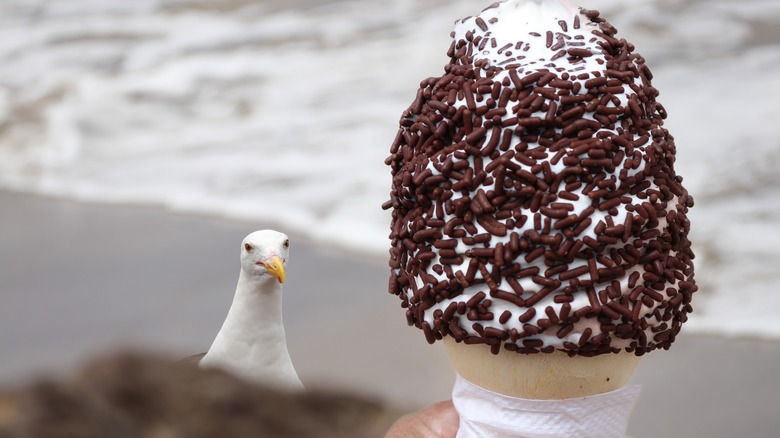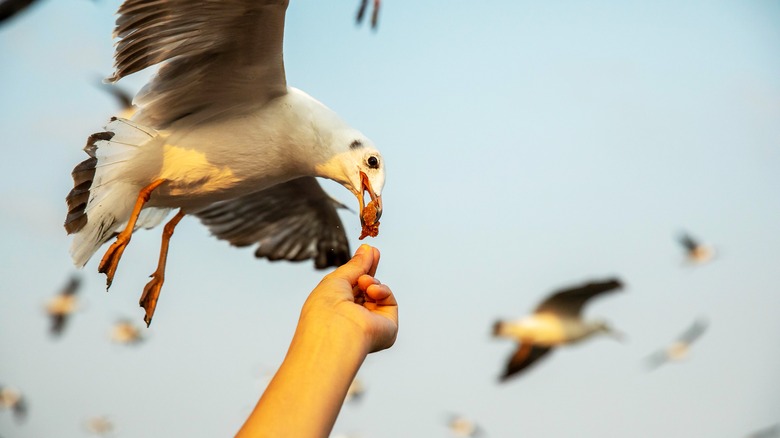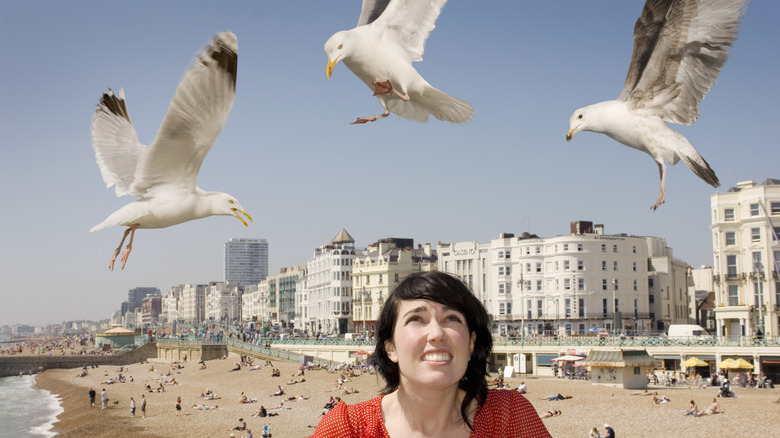Seagulls Steal Our Food On The Beach For One Bizarre Reason, According To Science
No one likes getting their stuff stolen, but unfortunately, it happens. And while you might expect it when you're wandering through countries with lots of pickpockets, you probably assume you're safe when you're taking a leisurely stroll on the beach with a snack in hand. That's where you're wrong. We hate to break it to you, but if you're in seagull territory, your snack is fair game. These birds are apparently obsessed with humans and love copying our every move — especially when it involves food. And yes, that's according to science!
Seagulls have made quite a name for themselves as notorious snack thieves. In fact, a restaurant in Boston had to shut down its entire outdoor dining area just to stop these feathered criminals from stealing people's meals. Some places even have warning signs, reminding diners to keep an eye out — because these sneaky birds can swoop in and steal your lunch without a second thought. "The seagulls are very, very rambunctious," a cook working at a restaurant in Wingaersheek Beach told Boston.com. "They'll literally take the food out of your hand." And they don't stop at one — they'll call in backup, gathering in flocks to terrorize unsuspecting diners and picnickers. While it's definitely easier for them to mooch off us than fend for themselves, it turns out they also just really like us — and apparently trust us with their next meal.
Seagulls apparently copy our food choices
You know how you jot down restaurant recommendations from your favorite Instagram food influencer? Well, seagulls are basically doing the same thing when it comes to finding — or in this case, stealing — their next meal. A study by the University of Sussex in Biology Letters discovered that these flying thieves aren't as "bird-brained" as you might think. In fact, they're pretty sharp — they've developed a knack for observing us and, more importantly, what we're snacking on.
In one experiment, researchers found that seagulls only got interested in food that humans actually touched. Anything we ignored, they couldn't care less about. In short, these birds are fans of our taste in grub. "This interaction with humans is relatively modern, and what we can see is that gulls have adapted to thrive in urban environments by mimicking human food choices," Paul Graham, professor of neuroethology at the university and principal investigator of the study, explained in a press release. "Gulls didn't evolve to like chips. Over time they have had to learn to engage with humans in order to source food."
And if you think that's impressive, get this: They even know when to strike. Researchers from the University of Bristol's Faculties of Engineering and Life Science put GPS trackers on some seagulls and found that they're not just randomly flying around — they tend to show up at the most opportune times, when they know food is abundant. "Our data showed that gulls were not only present in high numbers during lunchtime to feed on leftovers, but also just before the start of the school and during the first break when students had their snack," Dr. Anouk Spelt, lead author of the Ibis study, said in a press release. You've got to give it to them: They're smart creatures indeed.
Stopping them from stealing your afternoon snack is a piece of cake
Seagulls might be the sneakiest food thieves around, but there's apparently a science-backed trick to stop them in their tracks. It doesn't involve anything you'd normally use to deter thieves or any of the hacks that you'd use against pickpockets, either. As it turns out, it's as easy as staring them down.
Yes, really — engaging in a staring contest with a seagull could be all it takes to save your lunch. Per a University of Exeter study published in Biology Letters, researchers discovered that when humans lock eyes with seagulls gearing up to swoop in, the birds either back off or take way longer to make their move. In a test of 74 gulls, only 27 even tried to steal food when they were being stared down, and even those took their sweet time. "Gulls are often seen as aggressive and willing to take food from humans, so it was interesting to find that most wouldn't even come near during our tests," lead author Madeleine Goumas said in a press release. So yeah, feel free to give them the stink eye — it's one of the rare moments where staring isn't rude!
One thing to never do, however, is to feed them on purpose. According to Massachusetts' state ornithologist Andrew Vitz, doing so may only make them bolder. "If they start expecting handouts from people ... not only are they going to try to take your french fries or your bun or whatever, they might actually get more aggressive than that and start nipping at your fingers," he told Boston.com. "They are wild animals ... You can't exactly predict what they're going to do," he added.


